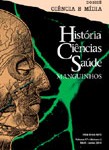November 2021
HCS-Manguinhos Blog|

Xingbo Luo is also a Council Member of the Division of History of Science and Technology (IUHPST/DHST), as well as the Secretary-general of the Chinese Society for the History of Science and Technology.
Historian Xingbo Luo is a professor from the Department of History of Science and Technology at the University of Chinese Academy of Sciences. His recent work includes research on the history of agriculture in China and on contemporary Chinese scientists. We asked him some questions about the impact of COVID-19 on his academic work, and about China’s history of science and technology.
How the pandemic of covid had an impact in your research? In what are you working now?
Prior to the global spread of the COVID-19 pandemic, I was working with my team on a major research project, which was a historical investigation focused on contemporary well-known Chinese scientists. Our daily research work included consulting a large number of historical archives, arranging detailed manuscripts of scientific researchers, conducting interviews with some scientists to constitute an oral history, as well as writing academic biographies for a number of these scientists. In addition, we conduct research on scientific groups.
After the outbreak of the epidemic in early 2020, the aforementioned research projects were seriously affected in the short term. Because the consequences of COVID-19’s social and economic effects were not predictable, the Chinese government took quite strict prevention and control measures in the early stages of the outbreak. While quickly breaking the chain of virus transmission, interpersonal communication also became relatively difficult and arduous. In order to prevent and control the epidemic, archives, libraries and other related supporting institutions suspended their services to the public within a few months at the beginning of the epidemic. In some cities with strict prevention and control, universities, middle schools and primary schools applied a closed campus policy. After a short delay of regular courses, schools began to institute the method of online teaching. This has had a great impact on my ongoing research, especially going to the archives, and carrying out oral history interviews, which were suspended. But on the other hand, it also has had some good effects, because I obtained more time to conceive and write my academic papers with fewer interruptions.
This state of affairs lasted for about 2 to 3 months. After the epidemic situation in China had become well-controlled, public places were gradually reopened, and my research work also virtually resumed. But compared with before the epidemic, there were some changes in my working modes. Network communication technology has become more and more important for research purposes because it is not convenient for cross-regional travel, whereas academic exchanges are often carried out by means of networking meetings, especially after the interruption of transnational academic travel, international academic lectures are held more frequently, and so on. Online meetings are so convenient that more and more scholars are difficult to meet in real life, thus many have instead arranged various online meetings, which even become a burden for scholars.
My research work was basically restored before the end of 2020. Considering that the interviewees for oral interviews are often older and the risk of infection for COVID-19 was higher, face-to-face interviews were understandably still not frequent. In November 2020, Chinese Society for the History of Science and Technology recovered its offline academic annual meeting, with about 800 scholars and postgraduates nationwide attending it. This is the largest number of participants in the history of the annual meeting of Chinese Society for the History of Science and Technology. It seems that scholars prefer offline and more direct academic exchanges. After the Chinese government’s strict control of the epidemic and with the large-scale vaccination with varying COVID-19 vaccines, the academic research activities in the related fields of history of science and technology in China have basically become normalized except for international academic travel that has not yet fully recovered.
In your experience; what are the challenges and opportunities of comparative (or transnational) historical work?
During the epidemic period, scholars became more aware of the importance of digital archives utilization and its information sharing. The archives began to speed up the digitization and gradually opened this to the public, which facilitated the development of historical research. Meanwhile, we also fully consider the diversity of historical research methods. In addition to the research based on texts, there are still some difficulties for various other research objects or methods, such as industrial heritage, investigation and research of traditional skills, oral history and other fields that need to emphasize on-site investigation, and so on.
In the meantime, in more than a year since the outbreak of the epidemic, Digital Humanities Research has developed rapidly in China. Although the concepts and methods of Digital Humanities have been spread in China for a long time, this field has never developed as rapidly as it has in the past year. In 2020 and 2021, China had held national academic conferences for Digital Humanities, which not only involved scholars in the history of science and technology, but also exhibited scholars in cultural heritage, ethnology, philology and many other fields. Chinese Society for the History of Science and Technology will soon establish a professional commission for digital humanities to promote Digital Humanities collaborative research and academic exchanges across the country. During the epidemic period, for the study of the history of science and technology in China, Digital Humanities is facing a new opportunity for development and progress.
What historians of science from other continents (like Latin America and the US) should pay more attention to the history of science in China?
China’s history of science and technology is a part of world civilization and human culture. Chinese scholars warmly welcome historians of science from other countries to pay attention to China’s history of science and technology, and also welcome to work with scholars from other countries to study China’s history of science and technology from the perspective of globalization.
As far as the current situation is concerned, Chinese historians of science and technology are often used to focusing on the past characters, events and ideas, while ignoring the contemporary history of science and technology development to a certain extent. In fact, the history of contemporary science and technology is very important. In addition, it is not enough to observe the development history of science and technology from within Chinese society, and external perspectives are also particularly important.
The complexity of Chinese language, including ancient Chinese, ethnic characters and dialects, is a difficult work for scholars from other continents who participate in the study of the history of Chinese science and technology. Meanwhile, considering the particularity of Chinese archives in satisfying Chinese and international scholars, Chinese historians of science and technology hope to conduct joint research on topics of common concern with historians of science from other continents who are concerned about the history of China’s science and technology.
In recent years, some Chinese universities and scientific research institutions have set up funds for young students and scholars from all over the world to come to China, and to exchange and study with Chinese scholars. Personally, I think this is a very good resource for young students and scholars interested in the study of the history of Chinese science and technology.
How to cite this post:
Luo Xingbo. China, COVID19 and the History of Science.
In: Revista História, Ciências, Saúde – Manguinhos (Blog). Published on November, 16th, 2021. Accessed in [date].
Recent Representative works by Xingbo Luo:
1, Reconstruct agricultural China? A Study on Sino-US Teamwork of Agriculture Technologies Collaboration. The Chinese Journal for the History of Science and Technology, No.4(2019).
2, Contemporary Famous Chinese Scientists, Vol 2, Vol 3. Beijing: China Science and Technology Press, 2017.
3, An analysis on original fellows of The Royal Society of London. Journal of Dialectics of Nature, No.8(2018).
4, Current Situation and Measures of Motivating Students Majoring in Natural Sciences and Engineering to Participate in Science Popularization in Several Countries: Based on a Small scale Investigation in a German Institute. Studies in Dialectics of Nature, No.2(2021).
See our section Coronavirus and History








